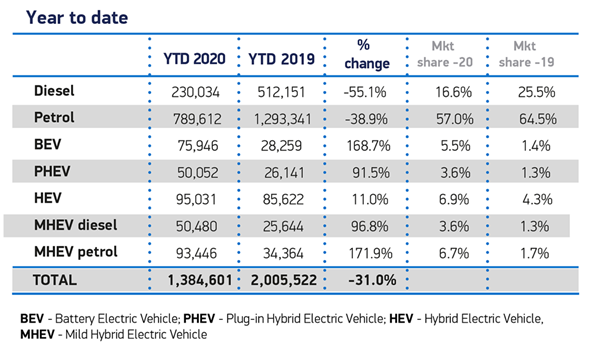Flexible rental enables blended fuel policies as fleets adapt to changing environment
Fleet operators are turning to flexible rental as they develop blended fuel policies in response to the growing range of electrified vehicles on the market
Fleet operators are shunning ‘one size fits all’ fuel policies in favour of a more flexible approach in response to a growing range of alternatives from manufacturers.
A ‘changing of the guard’ is taking place as companies and drivers ‘vote with their fleet’ and move away from diesel, with plug-in cars taking an increasing share of registrations.
New figures from the Society of Motor Manufacturers and Traders show that plug-in vehicles accounted for one-in-10 car registrations during October, while 36% of car registrations were plug-in vehicles or hybrids.
During October, diesel accounted for 15% of car registrations, a fall of 38% year-on-year. Demand for petrol also fell, with sales down 21%; it accounted for 50% of car sales.
For the year-to-date, diesel now accounts for 17% of the new car market; plug-in and hybrid cars now account for 26% of new registrations.
The trend is being seen throughout Europe, with the latest figures from the ACEA, the European manufacturers’ trade body, revealing that plug-in and hybrid cars took around 25% of sales between July and September.
Demand for plug-in cars has doubled across Europe this year, reaching 770,000 registrations by the end of September. Non-plug-in hybrids accounted for a further 1 million registrations.
While most vans remain limited to diesel, a growing number of fleets are announcing that they will be emission free before the end of the decade.
Royal Mail, one of Britain’s biggest fleets, is the latest to join the UK Electric Fleets Coalition, which is calling on the UK Government to commit to 100% electric vehicle sales by 2030.
Around 30 businesses have joined the coalition, which was created by environmental organisation Climate Group. Major fleets include Anglian Water, BT, DPD UK, EDF, E.ON, Scottish Power, Mitie, OVO Energy, Severn Trent, SSE, Tesco and Unilever, along with some of the country’s largest leasing and fleet management companies.
The government is currently consulting on whether to bring forward a planned ban on the sale of new petrol and diesel cars and vans, including hybrids, from 2040 to 2035.
The rapid change in fuel options is leading to uncertainty among many fleets, particularly those that need access to cities, where Low Emission Zones and even Zero Emission Zones are being planned.
This makes long-term vehicle commitments difficult and is leading to an increase in demand for flexible rental, so that businesses can adapt their fleet in line with market changes.
Lisa Spong, Sales Director of Reflex Vehicle Hire, said:
“The choices facing fleet operators are becoming increasingly varied and complex, so making long-term commitments through leasing or purchase may prove costly in the long-run.
Instead, fleets are turning to flexible rental as a way of developing blended policies that introduce new fuel options. This strategy also ensures businesses can increase or decrease their fleet size in response to market developments, without incurring a penalty.”
For details on the wealth of vehicles available on flexible terms from Reflex Vehicle Hire, review our Vehicle Selection page or contact one of our expert team members.

Share to:
Find out more
Find out how Reflex Vehicle Hire can help your company.
Call 0330 460 9913 or visit our contact us page.







@2x.png)

